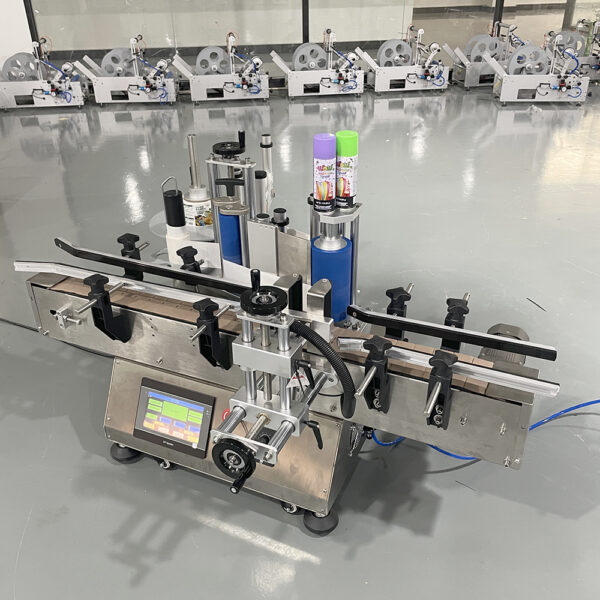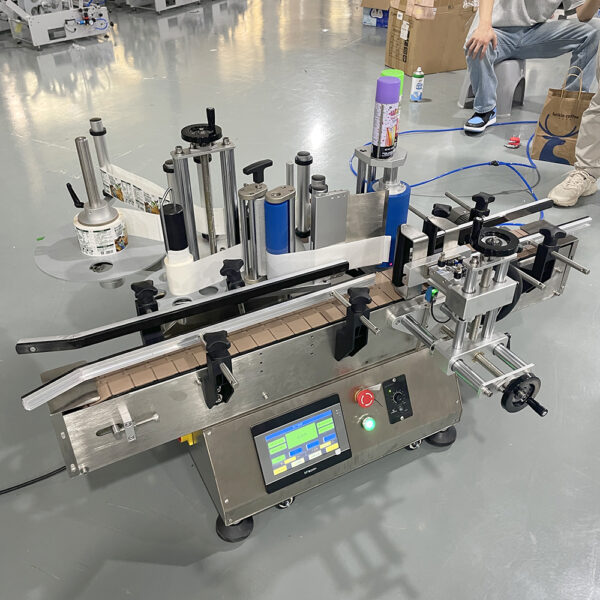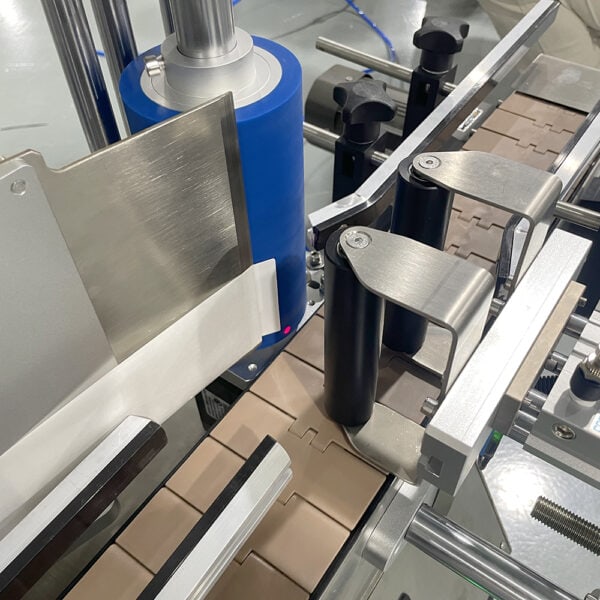Industries relying on high-quality packaging, such as food, cosmetics, and electronics, face an important choice between rolling and positioning bottle labeling machines, each with distinct benefits. Choosing the right machine type impacts labeling accuracy, production efficiency, and overall operational costs.
A rolling bottle labeling machine utilizes friction-based rotation to quickly apply labels, ideal for mass production with lower precision requirements, while a positioning bottle labeling machine secures bottles for precise label placement, suitable for premium products needing exact alignment.
The right labeling machine can optimize your production line efficiency and product appearance. Let’s dive into the structural, functional, and application differences between these two popular bottle labeling machine types to help you make the best choice.

Labeling Method
Rolling Bottle Labeling Machine
A rolling bottle labeling machine uses friction created by rollers and a conveyor to rotate the bottle, ensuring even label application as the bottle spins. Since this method relies on friction rather than securing each bottle in a specific position, it’s suitable for high-speed, continuous production lines.
Products that don’t need precise label alignment, such as bottles without logos or directional markings, benefit greatly from this method, as it significantly speeds up production and reduces setup time.
Positioning Bottle Labeling Machine
In contrast, a positioning bottle labeling machine employs a specialized positioning system that holds each bottle in place for labeling. This method is ideal for bottles with pre-defined markings, such as logos, where the label must align perfectly with the bottle design.
Positioning bottle labeling machines are essential in high-end industries requiring consistent branding, as they use sensors and positioning controls to apply labels precisely, even on bottles with complex shapes or contours.
Applicable Bottle Types
Rolling Type
Rolling bottle labeling machines are adaptable to a wide range of round bottles with minimal variation in diameter or height. This type of machine works best with standard, symmetrical bottles, allowing for uniform and efficient labeling without complicated adjustments.
Companies needing high-volume production with standard bottle types, such as those used for beverages or household cleaners, often find rolling machines an economical choice.
Positioning Type
Positioning machines are more versatile when it comes to handling bottles with unique shapes or distinct features, such as grooves or designated positioning points.
The machine’s ability to align labels with specific bottle areas is especially valuable for products with logos or other brand markings, ensuring a polished, professional appearance. Examples of industries that benefit from positioning machines include customized labeling machine applications, where high-quality branding is crucial.

Labeling Precision
Rolling Type
The rolling bottle labeling machine offers moderate precision, which may vary slightly due to the friction-based rotation method.
Small shifts in label position can occur, especially at high speeds, making this type of machine suitable for products where minor label alignment differences are acceptable. For companies that prioritize speed over pinpoint accuracy, rolling machines provide a robust solution at a relatively low cost.
Positioning Type
Positioning bottle labeling machines excel in environments requiring high precision, as they ensure each label aligns with exacting accuracy on every bottle.
Through the use of advanced sensors and positioning mechanisms, these machines achieve consistent, repeatable label placement, perfect for industries like cosmetics and pharmaceuticals, where label alignment reinforces brand integrity and complies with stringent packaging standards.
Equipment Cost
Rolling Type
One of the rolling bottle labeling machine’s advantages is its simpler construction, which generally results in a lower price point. This makes it accessible to businesses with budget limitations or those producing lower-cost items in large volumes.
The simpler setup also reduces maintenance costs, making it a cost-effective option for operations prioritizing high output over labeling precision.
Positioning Type
Positioning bottle labeling machines require more intricate systems, including sensors and positioning controls, making them a more substantial investment. However, this added cost is justified in high-value industries where accurate labeling enhances brand identity and customer trust.
Although positioning machines are costlier, they deliver high precision, making them the preferred choice for premium products or when meeting regulatory standards is crucial.

Application Scenarios
Rolling Type
Rolling bottle labeling machines are frequently used in high-speed production environments, such as in the food and household goods industries, where products like beverages and personal care items are mass-produced. The machine’s speed and efficiency make it ideal for general-purpose labeling, enhancing productivity for companies that value throughput.
Positioning Type
Positioning bottle labeling machines find their best use in specialized industries, including pharmaceuticals, electronics, and cosmetics, where precise label placement supports both branding and regulatory compliance.
These industries often require exact label alignment to ensure product consistency and maintain brand standards. Companies that prioritize quality and aesthetics in their labeling, such as those producing luxury items or regulatory-sensitive products, typically favor positioning machines.
Conclusion
The rolling bottle labeling machine is ideal for high-speed, high-volume labeling tasks where minor alignment variances are acceptable, whereas the positioning bottle labeling machine is tailored for products requiring precise, consistent label placement.
Choosing between these two depends on your product’s specific features, labeling requirements, and production goals. With the right selection, your production line will benefit from enhanced efficiency, product appeal, and customer satisfaction.









